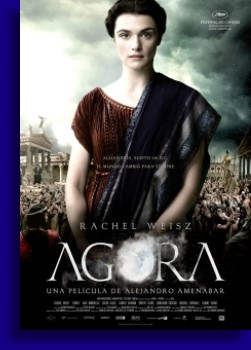

Reviewed by
Christopher Armstead


From director Alejandro Amenabar comes ‘Agora’, a very ambitious, lush and detailed chronicling of the life of the philosopher Hyapatia during the early days of the rise of the singular force known Christianity.
Rachel Weisz, in yet another fabulous performance to add to her already swollen list of great performances, is the philosopher Hyapatia who spends her time teaching her students the ways of the world, at least as they are understood the world to be at this particular time being close to 400 years after the birth of Christ. While she teaches there is a loyal slave named Davus (Max Minghella) who is always by her side as her assistant and is finding himself in the precarious position of falling in love with her, though this love can probably never be.
Hyapatia, for her part, is oblivious to the young man’s feelings for her as she seems to be oblivious to most things involving other people as her sole passion lies in unlocking the mysteries behind the world that she lives in. One of her students, Orestes (Oscar Isaac), has unashamedly declared his love for Hyapatia to anyone who is willing to listen, and as far as ‘catches’ go Orestes would qualify as a good one considering the young man is handsome, intelligent, brave and ambitious but as Hyapatia’s old man Theon (Michael Lonsdale) points out to his colleagues at the bathhouse, marriage would be counter productive to everything that Hyapatia wishes to accomplish in life and this is something she equates to a fate worse than death. You know, there might’ve been some cool things going on during this time, but I don’t see hanging out with my boys at bathhouses was not one of these things.
Now here come the problems because Paganism is on its way out and Christianity is on its way in, and in a huge way, and this particular era of Christians really wasn’t big on tolerance. It didn’t help matters that the Pagans chose to attack these Christians for insulting their gods, and as uncool as that may been, that one god of theirs in particular was wearing the equivalent of a flower pot on its head. Regardless, this unwise move resulted in the Pagans getting thrown out of the agora and the Christians, and eventually their leader Cyril (Sami Samir), becoming the main power of this city of Alexandria.



Davus is eventually freed by Hyapatia and crusades violently with his mates against all things non-Christian. In addition to this the majority of the politicians have caved in to the growing power of Cyril and there are some things that Cyril has informed his followers that The Word simply doesn’t care for. In particular women who talk, period, and people who believe in nothing. Believe me when we tell you that ‘holding ones tongue’ is not Hyapatia’s way. Orestes has become the Mayor, more or less, and keeps the atheist Hyapatia, whom he is clearly still in love with, very close as an advisor, and he has been instructed by the religious leader to follow The Word in regards to this woman or pay the severe consequences. Life for Orestes would be so much easier if Hyapatia would just convert. History tells us that this did not happen.
‘Agora’ was a difficult movie, a complex movie, an overreaching movie in parts, a thought provoking movie and most importantly, at least in my opinion, ‘Agora’ was a very good movie. As anyone who has an interest in viewing objects of a historical nature brought to life would probably attest to, Amenabar’s film is wondrous in bringing a visually distant time in the History of Man to the forefront. Because of the time period and as we can plainly see by the burning of documents and the destruction of artifacts, we are getting more of an interpretation than one of hardcore facts, but in the absence of these facts what we are witnessing is nonetheless riveting.
You may often ask yourself, as I do, how does someone justify murder in the name of God, particularly Jesus Christ who never raised His hand against anyone. That is, of course, the body of Jesus and not God (depending on your point of view of the Trinity) who has raised His hand a number of times. It is interesting how Amendabar injected into his film the character of Davus mentioning the forgiving nature of Jesus, perhaps as an approach how they should behave towards their enemies, to which Davus was chastised severely for comparing himself to God. The words ‘What Would Jesus Do’ never meant so little.
The attacks on religious intolerance are straight forward but more ‘out there’ so to speak and more open to audience interpretation, as are the various shots the director uses from space and beyond. One of Hyapatia’s many philosophical passions was earth and the relation of earth to space and the sun. At this time the over riding theory was that the Earth was the center of the universe, which we obviously know now isn’t the case, but it was fascinating watching this discussion take place and the theories in support and against such a view. Do the shots from distant space represent how insignificant we are in the universe, to actually believe that our worthless views actually matter? Or maybe he’s pointing out, considering the prevalent views of the universe were so terribly wrong, what other views were completely out of line during this time?
There are many things such as this in ‘Agora’ which requires its audience to do much more than just watch pretty pictures slide by in front of us. This is very much appreciated, though I wouldn’t want to be mentally challenged everyday because I have much better things to do with my brain than use it for thinking. Oh good heavens no, but ‘Agora’ despite a few flaws, is a very challenging and a very rewarding film.

